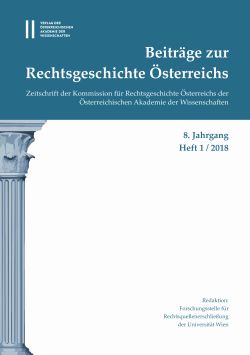 |
 |
Thomas OLECHOWSKI (Hgg.)
Beiträge zur Rechtsgeschichte Österreichs
8. Jahrgang
Heft 1 / 2018
 Andrzej DZIADZIO Andrzej DZIADZIO
S. 39 - 62 doi: 10.1553/BRGOE2018-1s39
Verlag der Österreichischen Akademie der Wissenschaften doi: 10.1553/BRGOE2018-1s39
Abstract:
The Basic Law on the General Rights of Citizens, proclaimed on December 21, 1867, guaranteed every citizen the freedom of expression. However, the laws proclaimed before the December Constitution had introduced legal measures that allowed government control over the press, associations, and assemblies. The underlying assumptions of the bills proclaimed between 1862 and 1867 were only partially aligned with the vision of a liberal legal state. The new Constitution did not repeal the legislation of the previous political system. It incorporated the catalogue of fundamental rights and freedoms into existing legislation, some of which had been created during the police state period. The Galician bureaucracy, much like its counterparts in the other parts of Austria‐Hungary, used this legislation to regulate the public activity of its citizens and suppress open criticism of the government. It took advantage of the criminal law from the time of the absolute monarchy, which put severe constraints on the right to criticize the government. The intensification of repression against the opposition by the end of 19th century, including the confiscation of newspaper issues and the dissolution of associations and assemblies, was politically motivated, both in Galicia and in the entire monarchy. The conservative elites in power came under pressure of radical anti‐state social movements. This political change had to be reflected in the functioning of the organs of the state. Socialism, nationalism, secularism, and other ideologies posed a threat to the very foundations of the monarchy. Using the legislation from the times of absolute monarchy for their original purpose, i.e. the protection of government, the Church, and the owning class, was a natural defence mechanism. The liberal character of the December Constitution of 1867 had to give way to the repressive power of criminal law. The administrative practices of the Galician authorities were a classic example of this process.
freedom of assembly – freedom of association – December Constitution – Galician vice‐regency – press censorship Published Online:
2018/06/05 12:32:31 Object Identifier:
0xc1aa5576 0x00390141
Rights:All rights reserved.For questions regarding copyright and copies please contact us by email.
Inhaltsverzeichnis
Peter DINZELBACHER, Salzburg
Pädophilie im Mittelalter
Andrzej DZIADZIO, Krakau
Presse‐, Vereins‐ und Versammlungskontrolle in der galizischen Behördenpraxis (1867–1914)
Heidi HEIN‐KIRCHER, Marburg a.d.L.
Von Instrumenten der Durchstaatlichung zu Instrumenten des Nationalitätenkonflikts
Zur nationalitätenpolitischen Bedeutung von Städtestatuten
am Beispiel des Lemberger Statuts
Eszter Cs. HERGER, Pécs
Ist die Zugewinngemeinschaft ein deutsches Phänomen?
Die konzeptionellen Umgestaltungen der
Errungenschaftsgemeinschaft im ungarischen Ehegüterrecht
Mariken LENAERTS, Maastricht
The influence of National Socialism on divorce law in Austria and the Netherlands
János NÉMETH, Budapest
Sprachgebrauch im Ödenburger und Pressburger Prozessrecht
an der Wende des 16./17. Jahrhunderts
Christian NESCHWARA, Wien
Konfessionell gebundene Ehehindernisse im österreichischen
Allgemeinen Bürgerlichen Gesetzbuch
Strategien zur Umgehung des österreichischen Eherechts
István SZABÓ, Budapest
Die Rolle des Gewohnheitsrechts im ungarischen Verfassungsrecht nach 1848
Tätigkeitsbericht
KRGÖ und FRQ im Jahr 2017
|




 Home
Home
 Print
Print
 References
References
 Share
Share
 Andrzej DZIADZIO
Andrzej DZIADZIO